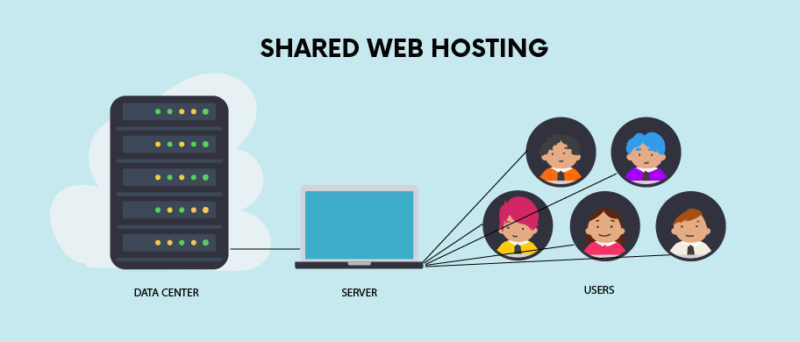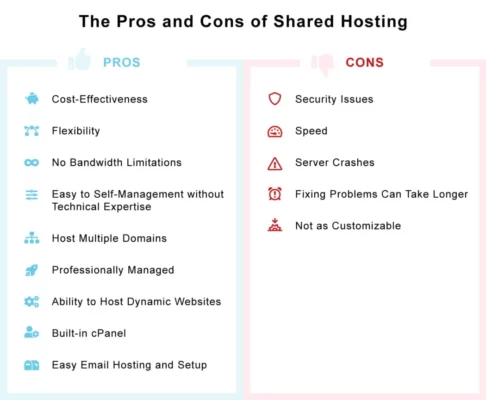Shared hosting is a form of web hosting in which a single server is used to host multiple websites. This means that the resources of the server, including CPU, memory, and storage, are shared among the websites hosted on it.
Shared hosting is a cost-effective solution for hosting small to medium-sized websites because the cost of maintaining and managing the server is split among the websites hosted on it.

Read also: Shared, VPS & Dedicated Web Hosting Providers Comparison & Recommendations
Understanding the Operation and Key Features of Shared Hosting:
The provider is responsible for maintaining and managing the server and its resources, as well as handling tasks like security updates and backups. Shared hosting often includes a variety of features such as email accounts, database support, and scripting languages. These features are usually included in the hosting plan. To manage their website and access various tools and resources, website owners typically use a control panel provided by the shared hosting provider
Best Shared Hosting Providers:
- Bluehost is a hosting provider that is known for its affordable prices and user-friendly control panel. It also provides a free domain name for the first year and a free SSL certificate.
- HostGator is a hosting provider that is well-known for its 24/7 customer support and unlimited storage and bandwidth. It also has a 45-day money-back guarantee.
- InMotion Hosting is a hosting provider that is known for its fast loading speeds and excellent customer support. It offers unlimited storage and bandwidth, as well as a free SSL certificate.
- A2 Hosting is a hosting provider that is renowned for its fast hosting speeds. It offers a range of shared hosting plans that are optimized for different types of websites, including WordPress and e-commerce sites
To choose the best shared hosting provider, it's essential to consider factors like price, features, uptime, and customer support. It's also a good idea to read reviews and research different providers to find the one that best fits your needs.
Features:
Multiple Websites Sharing a Single Server:
Shared hosting allows multiple websites to be hosted on a single server, meaning that the server's resources like CPU, memory, and storage are shared among these websites. While this can potentially lead to reduced performance if one website consumes a large amount of resources, it also means that the hosting costs are split among the websites, making shared hosting a cost-effective choice for small to medium-sized websites.
Limited Control Over Server Resources And Configuration:
Shared hosting also means that website owners have limited control over the server resources and configuration. While they can usually customize certain parts of their website, such as content and design, they do not have complete access to the server and its resources. This means that they cannot change the server configuration or install custom software.
Shared IP Address:
If multiple websites are hosted on the same server, they will all share the same IP address. This can cause problems if one of the websites hosted on the server engages in inappropriate or malicious activities, as the IP address could be blocked or blacklisted as a result.
Cost-Effective Pricing:
Shared hosting is known for its cost-effective pricing compared to other web hosting options like dedicated hosting or VPS hosting. This is because the hosting costs are divided among the multiple websites hosted on the server. Shared hosting plans usually come with a variety of features and tools like email accounts, databases, and scripting languages, which are included in the price. This makes shared hosting a good choice for small businesses or individuals who want a cost-effective way to host their website.
Types of shared hosting:
Basic Hosting:
Basic shared hosting is the most common form of shared hosting. It is usually the cheapest option and is suitable for small to medium-sized websites. With basic shared hosting, the provider maintains and manages the server and its resources, while the website owner is responsible for uploading and maintaining their own web content. Basic shared hosting usually includes a variety of features like email accounts, database support, and scripting languages
Managed Hosting:
Managed shared hosting is a type of shared hosting that includes extra support and management services. In managed shared hosting, the provider handles tasks like security updates, backups, and performance monitoring in addition to maintaining and managing the server. Managed shared hosting is a good option for website owners who don't have the time or expertise to manage their own website or who want additional support and assistance.
Cloud-Based Hosting:
Cloud-based shared hosting is a type of shared hosting that uses cloud computing technology to host websites. In cloud-based shared hosting, the website is hosted on a network of servers instead of a single server. This provides more flexibility and scalability, as the website can access additional resources as needed. Cloud-based shared hosting is a good choice for websites that experience fluctuating traffic levels or need to scale quickly. It is usually more expensive than basic shared hosting, but may offer additional benefits such as increased uptime and performance.
Pros and Cons:
Advantages:
- Cost-effectiveness: Shared hosting is a great option for small businesses or individuals who are looking for a cost-effective way to host their website. This is because the hosting costs are shared among multiple websites, making the plans much cheaper than dedicated hosting or VPS hosting
- Ease of use: Shared hosting is known for its ease of use, particularly for those new to web hosting. Shared hosting plans usually include a control panel, which allows website owners to easily manage their website and access various tools and resources. This makes shared hosting a good choice for those who are not familiar with web hosting or who don't have the time or expertise to manage their own server.
- Good Option for small and medium-sized websites: Shared hosting is a good option for small to medium-sized websites, as it offers enough resources and features for these types of websites.
Disadvantages:
- Limited control and customization: One of the main drawbacks of shared hosting is the limited control and customization that website owners have over the server and its resources. Website owners do not have full access to the server and cannot make changes to the server configuration or install custom software. This means that they cannot change the way the server works or add their own programs to it.
- Potential for reduced performance due to shared resources: Another potential drawback of shared hosting is the potential for reduced performance due to the shared nature of the server resources. If one of the websites hosted on the server uses a lot of resources, it could potentially slow down the other websites. This is generally not an issue for small to medium-sized websites, but it could be a problem for larger websites or those with high traffic levels.

Choosing the Right Provider:
Researching Potential Providers:
When choosing a shared hosting provider, it's essential to carefully research and compare different providers:
-The type of hosting plan that would best fit your needs
-The provider's reputation
-The quality of customer support
-The provider's uptime record
-The provider's security features
Determining your Hosting Needs:
Before selecting a hosting provider, it's important to figure out your hosting needs. Some things to consider include:
-What type of website are you building?
-What are your website's requirements (e.g. storage, bandwidth, CPU, etc.)?
-What is your budget for hosting?
Pros and Cons of Different Providers:
After you have determined your hosting needs, you can compare the pros and cons of different providers to find the one that is the best match for you. Take into account factors like cost, features, performance, and customer support to find the provider that best fits your needs.
Ongoing Management and Evaluation:
After you have chosen a shared hosting provider, it's important to monitor the performance and uptime of your website and be aware of any changes or updates to the provider's terms of service or pricing plans. It's also a good idea to occasionally evaluate the need to switch providers if necessary.
Conclusion:
Shared hosting is a popular and affordable way to host small to medium-sized websites. It allows multiple websites to share a single server, which means that the hosting costs are divided among these websites. This makes shared hosting a good choice for small businesses or individuals who want a cost-effective way to host their website.
However, it's essential to thoroughly research and select the right shared hosting provider to ensure a positive hosting experience. When choosing a provider, consider factors like reviews and ratings, prices and plans, uptime and performance, and reputation and customer support. You should also consider your hosting needs and weigh the pros and cons of different providers to find the one that best fits your needs.





[…] Shared hosting is a form of web hosting in which a single server is used to host multiple websites. This means that the resource […]